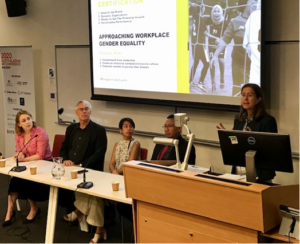Investing in Women (IW) and its partners from the Philippines, Indonesia and Australia presented a panel on Workplace Gender Equality (WGE) in Southeast Asia and Australia at the 2020 Australasian Aid Conference in Canberra. More than 50 people attended the session and participated in a vibrant conversation around IW’s approach and the challenges to achieving WGE.
Kate Lee, Engagement Executive Manager of Australia’s Workplace Gender Equality Agency (WGEA) presented key points gathered from the agency’s work with the private sector. In Australia, businesses with 100 or more employees are required by law to report on their efforts to improve WGE within their companies. Lee identified areas of progress, such as the gradual reduction in the gender pay gap and the increased number of women promoted to management positions. She also addressed areas where there has been little improvement—particularly the number of women at CEO level and on boards.
Lee also highlighted the positive impact of the mandatory reporting of private sector companies to WGEA on WGE in Australia. According to her, industry benchmarking and an annual reflection on policies and practices have led to significant improvements.
IW Monitoring, Evaluation and Learning Director, Andrew Rowell, highlighted the strong potential for further change in the formal sector in IW’s four target countries: Indonesia, Vietnam, Myanmar and the Philippines. Research shows that there is a high level of tertiary graduation among women in these countries, and that women are equally as ambitious as men, career-wise.

However, the percentage of women in upper management and leadership roles is significantly lower than men’s, and the reasons behind this can be better understood with the help of IW data. Factors that may be affecting this include the expectations of women to be the primary caregiver for children, and stereotypical views that women and men are more naturally suited to particular roles. Such gender norms restrict progress for women seeking better employment opportunities.
Julia Abad, Executive Director of the Philippine Business Coalition for Women’s Equality (PBCWE), shared the Coalition’s approach to supporting member firms through their organisational change journey towards improving gender equality outcomes. PBCWE’s support initiatives include conducting research, training and policy review for its members and promoting the business cases for change within the broader private sector.
Sandi Witomo, Sustainable Manufacturing & Sourcing General Manager at Adis Dimension Footwear in Indonesia, shared his firm’s internal initiatives to understand and improve workplace gender equality. Management at Adis is convinced that WGE is a sound investment. For them, a satisfied and supported labour force will work efficiently, produce high quality products, and be prepared for change and company expansion. In addition, Adis’ main clients are also very supportive of their efforts to advance WGE.
Company approaches to addressing sexual harassment and the role of companies in addressing domestic violence were among the WGE issues discussed during the session. Such are areas that need further innovation and better strategies, globally.
The panel explored approaches to developing the evidence base to demonstrate the business case for WGE and shared a range of possible business cases. The panel also talked about workplace initiatives to engage men in improving WGE, as well as the relevance of lessons from the formal sector to the informal sector.
The 2020 Australasian Aid Conference was held on 17 to 19 February at the Crawford School of Public Policy of the Australian National University in Canberra.
Learn more about workplace gender equality.

